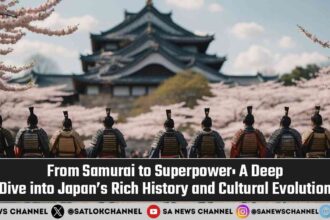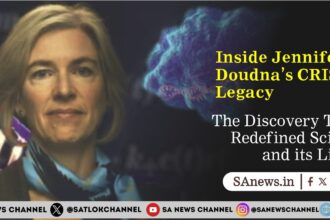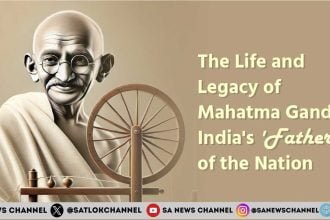Biography of Aung San Suu Kyi: Democracy is considered everyone’s right, but not every country in the world enjoys this right. Nearly 45 percent of the countries in the world are democratic, while the rest are still under hybrid or authoritarian regimes, military rule, theocracies, monarchies, or single-party states. Countless leaders worldwide have fought for democracy in their countries, but not all have been successful in achieving full or even partial democracy in their nations.
- Aung San Suu Kyi: Birth and Early Life
- Aung San Suu Kyi: Education
- Aung San Suu Kyi: The Path to Politics
- The 2021 Military Coup and Aftermath
- Aung San Suu Kyi: Personal Life
- Aung San Suu Kyi: Legacy
- Guiding Society Towards Spiritual Enlightenment Through Scriptural Knowledge:
- Connect With Us on the Following Social Media Platforms
This blog is about a leader who fought for democracy in her country, achieved it for a period, but then struggled to maintain it.
Yes, this is the story of Aung San Suu Kyi, the Burmese politician, author, and diplomat who also served as the State Counsellor of Myanmar and Minister of Foreign Affairs (2016–2021). Read on to learn about the life journey of Myanmar’s “Lady of Democracy”: Aung San Suu Kyi.
Aung San Suu Kyi: Birth and Early Life
Born on June 19, 1945, in Rangoon, Myanmar, Aung San Suu Kyi is the third child of Aung San and Khin Kyi. Aung San Suu Kyi has two brothers: Aung San Lin (who died young) and Aung San Oo. Her father, Aung San was Burma’s independence hero; he was assassinated in 1947, two years after she was born. Her mother Khin Kyi was a prominent diplomat and served as Burma’s ambassador to India.
Aung San Suu Kyi: Education
Aung San Suu Kyi’s early education took place in an English Catholic school in Burma. Later, in 1960, when her mother Khin Kyi was appointed as the ambassador of Myanmar to India, she attended the Convent of Jesus and Mary School in New Delhi. She graduated from Lady Shri Ram College, University of Delhi, in 1964 with a degree in politics.

To pursue B.A. in Philosophy, Politics and Economics, Aung San Suu Kyi moved to St Hugh’s College at Oxford. Later, she also continued her studies at the School of Oriental and African Studies (SOAS), University of London, working toward a Master of Philosophy degree in Burmese literature. She also worked for the United Nations for three years.
Aung San Suu Kyi: The Path to Politics
Aung San Suu Kyi entered Myanmar’s political scene at a pivotal moment in 1988. She returned to the country to care for her ailing mother, just as the 8888 Uprising – a series of mass pro-democracy protests – was unfolding. This served as an important point in her life. Not long after, she co-founded the National League for Democracy (NLD) and became a major political figure.

Later in 1990, the NLD won a landslide victory, but the military junta refused to hand over power. Instead, they placed her under house arrest for 15 of the next 21 years. This house arrest served to bring her international recognition and made her a symbol of peaceful resistance. In 1991, Aung San Suu Kyi won the Nobel Prize.
Also Read: Angela Merkel Biography | Life, Leadership & Legacy of Germany’s Iron Lady
After her release from house arrest, Aung San Suu Kyi and the NLD resumed political activity, and the NLD won the 2012 by-elections and later the 2015 general elections. Later, she served as the State Counsellor of Myanmar—a role similar to Prime Minister—from 2016 until the 2021 military coup.
The 2021 Military Coup and Aftermath
On 1 February 2021, the Myanmar military overthrew the democratically elected government and detained State Counsellor Aung San Suu Kyi, President Win Myint, and other leaders of the National League for Democracy (NLD). The coup took down the democratic government claiming unsubstantiated voter fraud as justification.

This military coup resulted in widespread protests and civil disobedience. The country observed massive arrests, crackdowns and communication blackouts. Soon the nation observed huge conflicts between the military junta and the pro-democracy groups.
Aung San Suu Kyi: Personal Life
Aung Sang Su Kyi married the British scholar Michael Aris on January 1,1972, in a Buddhist ceremony in London, England. With Michael, she had two sons, Alexander and Kim Aris. She lived in the UK with her family before returning to Myanmar in 1988 to care for her ailing mother. Following her active participation in politics and house arrest, she spent the later years of her adulthood separated from her husband and children. Her husband passed away in 1999, when she was under house arrest.

Aung San Suu Kyi: Legacy
The legacy of Aung San Suu Kyi is one of remarkable courage and profound complexity. She is the face of Myanmar’s pro- democracy movement. Not only is she an inspiration for millions, but she is also a symbol of hope for the oppressed people. The Nobel Peace Prize is not only a recognition of her peaceful protest against the military, but also a recognition of her steadfast strength. Her leadership transformed the democratic reforms and gave voice to the aspirations of the Burmese people.
Guiding Society Towards Spiritual Enlightenment Through Scriptural Knowledge:
Saint Rampal Ji Maharaj ji is the only saint in the world who is working for the spiritual upliftment of the society. Sant Rampal Ji Maharaj provides knowledge in accordance to all the scriptures of our holy religions. Saint Rampal Ji Maharaj ji, with the help of sacred scriptures, have proved that Kabir Saheb ji is the almighty.
Readers are requested to take initiation from Saint Rampal Ji Maharaj and attain the true way of worship. For more information visit www.jagatgururampalji.org.









